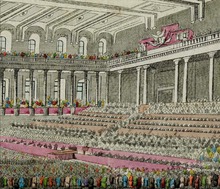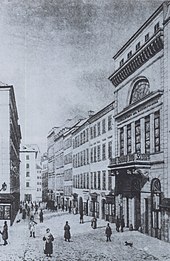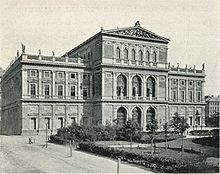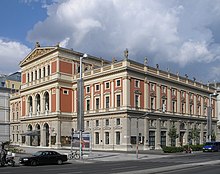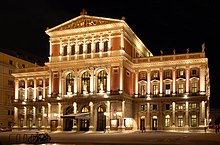Society of Friends of Music in Vienna
The Society of Friends of Music in Vienna (short: Wiener Musikverein ) is a traditional association in Vienna for the promotion of musical culture. It was founded in 1812.
founding
On 29 November and 3 December 1812 in the Winter Riding School of the Vienna Hofburg , the Handel - Oratorio Timothy listed. This concert can be seen as the trigger for the foundation of the Gesellschaft der Musikfreunde in Vienna. Joseph Sonnleithner (1766–1835), then secretary of the imperial Viennese court theaters ( Burgtheater and Kärntnertortheater ), is considered the founder of the association . The proceeds of the two concerts should benefit the newly founded institution. Emperor Franz I donated 1,000 guilders , the net profit was 25,934 guilders Viennese currency. The first seat of the company was the Lobkowitz Palace on today's Lobkowitzplatz .
aims
According to its statutes, which were drawn up in 1814, the "raising of music in all its branches" is the most important purpose of society.
The Gesellschaft der Musikfreunde achieves (e) this in three ways:
- the establishment of a conservatory,
- the systematic collection of music-historical documents (archive),
- organizing your own concerts.
Since January 2000, all editions of the monthly association newspaper Musikfreunde have been available on the company's website.
Concerts
The first choir activities of the Musikverein go back to Antonio Salieri's initiative, which for example was also involved in the Viennese premieres of Ludwig van Beethoven's Missa solemnis and the 9th Symphony in 1824 . After the association had given choir concerts for years, the concert choir was officially founded as a branch of the Vienna Music Association in 1858 . The first chief conductor of the Wiener Singverein was Johann von Herbeck , since 1991 Johannes Prinz has directed the choir .
First concert hall of the company
The first evening entertainment (chamber concerts) of the Musikverein took place in the Zum Roten Apfel house on Singerstrasse in Vienna. In 1820 the concert business moved to the Gundelhof .
1829, the company bought a for Kärnthnerviertl scoring house on the Tuchlauben ( home to the Red Hedgehog , rented from 1822, then House No. 558, today Tuchlauben. 12) with several business premises, apartments, had it torn down and gave in Franz Lössl (Construction Management: Carl Högl ) commissioned the construction of a three-story new building with a concert hall on the 1st floor for around 88,000 guilders (including furnishings). The building site was roughly across from what was then Ofenlochgasse, since 1863 Kleeblattgasse. The site of the fire did not branch off from the Tuchlauben at that time, but was located as a small square near St. Stephen's Cathedral.
The gala concert for the opening of the hall took place on November 4, 1831 (at that time cholera was raging in Vienna ). The Musikverein made a significant contribution to public concert life in Vienna at this location (concerts with a large number of visitors were still held in the Great Redoutensaal of the Hofburg ).
The hall soon proved to be too small with 700 seats, but was still used for almost 40 years. In 1846 gas lighting was installed. The conservatory and the society's archive, offices and rehearsal rooms were housed on the upper floors.
The company moved to their new house in 1870 and sold their first own house in the same year. In subsequent use, the Strampfer Theater emerged from this . The building was demolished in 1885.
Today's seat of the company
In 1863, Emperor Franz Joseph I donated the area on the bank of the Wien River opposite the Karlskirche to the society from state assets . It was on the former glacis in front of the city wall around the old town , which was demolished in 1858 . The present-day Vienna State Opera was built nearby in 1861–1869 , the Künstlerhaus on the neighboring building site on the banks of the Vienna River 1865–1868 , and today's Hotel Imperial on the square 1862–1865 adjacent to the Ringstrasse .
The house designed by Theophil Hansen , who later built the parliament, called Wiener Musikverein for short , was opened on January 6, 1870 with a solemn concert. In the same year, the emperor's chief steward, Prince Konstantin zu Hohenlohe-Schillingsfürst , was appointed an honorary member of the society in gratitude for the favor of the imperial court for the new building project.
In 1869 Carl Heissler became the first conductor of the orchestra of the Gesellschaft der Musikfreunde in Vienna. In 1871 and 1872, the Russian composer Anton Rubinstein was the company's artistic director. After a short time he was replaced by Johannes Brahms .
Children and youth projects
The Gesellschaft der Musikfreunde offers a corresponding program in order to give children and young people the joy of music and access to classical culture: In April 1989 there was the first "Festival for Children" in all the halls of the music club building, since then the offer has been steadily expanded now includes over 150 projects for all ages between 3 and 19 years. The 20th anniversary of the youth concerts was celebrated in 2009 with a big party in the Wiener Musikverein. The symbol of the children and youth concerts of the Gesellschaft der Musikfreunde is the concert clown Allegretto.
Artistic performances are prepared according to the respective age requirements, with particular attention being paid to opportunities for active participation. This includes singing and dancing along with the little ones, a gallery of children's drawings on the Internet and artist talks under the motto “meet the artist” with internationally renowned conductors, soloists and composers for 15 to 19 year olds.
Conservatory of the Society of Friends of Music
The conservatory was the first public music school in Vienna. In 1817 court conductor Antonio Salieri began to form a singing class. The Allgemeine Musikische Zeitung wrote about this on January 7th, 1818: “Our worthy court orchestra will be the beginning of a new conservatory to be founded. Salieri has already given free singing lessons to 12 girls and 12 boys. "
On April 19, the first 24 students of the Conservatory presented themselves to the public at a society concert and sang an a cappella choir Salieris. The dedication on the autograph reads: "Ringraziamento da farsi alli Benefattori del Conservatorio della musica nazionale tedesca dalli primi ventiquattro allieve dodici Ragazzi e dodici Ragazze, di detto luogo, nella quarta accademia dei dilettanti il giorno 19 April 1818".
In 1819 a violin school followed under the violinist Joseph Böhm .
In the 19th century this facility was significantly expanded, in the 1890s it already had over 1,000 students and was copied in other such facilities in Vienna. In 1909 the private institute was nationalized as the " kk Academy for Music and Performing Arts" by resolution of the emperor . This makes it the predecessor of today's University of Music and Performing Arts Vienna .
archive
The company's archive is one of the most important music collections in the world today . The scientific value of this collection is severely limited by the fact that there is no complete, publicly accessible catalog of it.
Personalities
founder
- Joseph Sonnleithner (1766-1835)
Co-founder
- Antonio Salieri (1750-1825)
- Fanny von Arnstein (1758-1818)
- Prince Franz Joseph Maximilian von Lobkowitz (1772–1816), major general, art lover and patron
Famous members
- Leopold von Sonnleithner (1797–1873), lawyer and music collector
- Jan Václav Voříšek (1791–1825), composer, pianist and organist, member from 1818.
- Franz Schubert (1797–1828), full member from June 12, 1827
Concert directors

- Josef Hellmesberger senior (1828–1893), artistic director 1850–1859
- Johann von Herbeck (1831–1877), artistic director 1859–1869
- Carl Heissler (1823–1878), artistic director 1869–1871
- Eduard Schön (1825–1879), Ministerialrat and composer, director around 1870
- Anton Rubinstein , artistic director 1871–1872
- Johannes Brahms (1833–1897), concert director 1872–1875
- Hans Richter (1843–1916), conductor, director until 1900
- Franz Schalk (1863–1931), concert director 1904–1921
- Ferdinand Löwe (1865–1925), concert director
- Wilhelm Furtwängler (1886–1954), concert director 1921–1927 (together with Leopold Reichwein)
- Leopold Reichwein (1878–1945), concert director 1921–1927 (together with Wilhelm Furtwängler)
- Robert Heger (1886–1978), concert director 1925–1933
- Walter Legge (1906–1979), director from 1946
- Herbert von Karajan (1908–1989), last concert director 1948–1964
Vice President
- Raphael Georg Kiesewetter (1773–1850), councilor and musician, vice-president 1821–1843
- Nikolaus Dumba (1830–1900), industrialist, Vice President around 1880
- Gustav Ortner (* 1935), diplomat, Vice President since 2001
Board members
- Heinrich Eduard Josef von Lannoy (1787–1853), conductor and composer, member
- Martin Gustav Nottebohm (1817–1882), musicologist and composer, member from 1858
- Anthony van Hoboken (1887–1983), musicologist and collector, member from 1957
- Czartoryski brothers , around 1870
Secretaries
- Leopold Alexander Zellner , Secretary General 1868–1891
- Hugo Botstiber (1875–1941), secretary and office director 1905–1912
- Franz Schütz , director installed by the National Socialists during the years 1938–1945
- Thomas Angyan (* 1953), General Secretary and Artistic Director since 1988
archivist
- Martin Gustav Nottebohm (1817–1882), 1864–1887
- Eusebius Mandyczewski (1857–1929), musicologist and composer, 1887–1930
- Karl Geiringer (1899–1989), musicologist and librarian, 1930–1938
- Hedwig Kraus (1895–1985), musicologist and archive director, 1930–1962
- Hedwig Mitringer, musicologist and archive director, 1962–1979
- Otto Biba (* 1946), musicologist and archive director, since 1979
Honorary members
A.
Claudio Abbado , 1991 (1933–2014)
Guido Adler , 1928 (1885–1941)
Anna Countess Amadei , 1898 (1828–1927)
Rudolf Graf Amadei , 1898 (1914–1898)
August Wilhelm Ambros , 1872 (1816–1876)
Daniel Francois Auber , 1836 (1782–1871)
B.
Wilhelm Backhaus , 1928 (1884–1969)
Giuseppe Abbate Baini , 1836 (1775–1844)
Daniel Barenboim , 2008 (born 1942)
Carl Ferdinand Becker , 1842 (1804–1877)
Ludwig van Beethoven , 1826 (1770–1827)
Charles- Auguste de Bériot , 1842 (1802–1870)
Hector Berlioz , 1846 (1803–1869)
Leonard Bernstein , 1988 (1918–1990)
Josef Freiherr von Bezecny , 1898 (1829–1900)
Louis von Bignio , 1871 (1839–1907)
Heinrich Edler von Gemmen Billing , 1896 (1834–1908)
Joseph Böhm , 1871 (1795–1876)
Karl Böhm , 1973 (1894–1981)
François-Adrien Boieldieu , 1829 (1775–1834)
Ludwig Bösendorfer , 1870 (1835–1919)
Count Karl Bombelles , 1888 (1832–1889)
Francisco de Paula de Borbón , 1818 (1794–1865)
Auguste Bottee de Toulmon , 1841 (1797–1850)
Pierre Boulez , 2004 (1925–2016)
Johannes Brahms , 1876 (1833–1897)
Anton Bruckner , 1891 (1824–1896)
Rudolf Buchbinder , 2007 (born 1946)
Ole Bornemann Bull , 1839 (1810–1880)
C.
Pablo Casals , 1930 (1876–1973)
Friedrich Cerha , 2007 (born 1926)
Emil Freiherr von Chertek , 1908 (1833–1922)
Maria Luigi Cherubini , 1827 (1760–1842)
Friedrich Chrysander , 1895 (1826–1901)
Prince Władysław Czartoryski , 1870 (1828-1894)
D.
Siegfried Wilhelm Dehn , 1842 (1799–1858)
Josef Dessauer , 1871 (1798–1876)
Theodor Döhler , 1842 (1814–1856)
Gaetano Donizetti , 1842 (1797–1848)
Friedrich Edler von Mährentheim Dratschmiedt , 1870 (1801–1885)
Nikolaus Dumba , 1877 (1830–1900)
Marie Louise Dustmann-Meyer , 1871 (1831–1899)
Antonín Dvořák , 1895 (1841–1904)
E.
Franz Egger , 1870 (1810–1877)
Gustav Egger , 1902 (1845–1926)
Gottfried von Eine , 1976 (1918–1996)
Heinrich Wilhelm Ernst , 1839 (1814–1865)
Heinrich Esser , 1871 (1818–1872)
Josef Edler von Eybler , 1826 (1765-1846)
F.
Francois Joseph Fetis , 1829 (1784–1871)
Gottfried Wilhelm Fink , 1837 (1783–1846)
Infanta of Spain, Francisco de Paula de Borbón , 1818 (1794–1865)
Georg Albert Freiherr von und zu Franckenstein , 1935 (1878–1953)
Robert Franz , 1886 (1815–1892)
Wilhelm Furtwängler , 1927 (1886–1954)
G
Ossip Gabrilowitsch , 1930 (1870–1936)
Wenzel Graf Gallenberg , 1829 (1783–1839)
Manuel Patricio Rodríguez García , 1905 (1805–1906)
Ferdinand Simon Gassner , 1842 (1798–1851)
Paul Gautsch Freiherr von Frankenthurn , 1888 (1851– 1918)
Wilhelm Gericke , 1884 (1854–1925)
François-Auguste Gevaert , 1895 (1828–1908)
Carlo Maria Giulini , 1978 (1914–2005)
Karl Goldmark , 1887 (1845–1922)
Caroline von Gomperz-Bettelheim , 1871 (1918 –1893)
Charles Gounod , 1888 (1818–1893)
Edvard Grieg , 1895 (1843–1907)
Franz Grillparzer , 1871 (1791–1872)
Jakob Moritz Grün , 1909 (1836–1916)
Alfred Grünfeld , 1922 (1852–1924)
Adalbert Gyrowetz , 1826 (1763-1850)
H
Jacques Fromental Halévy , 1841 (1799–1862)
Eduard Hanslick , 1895 (1825–1904)
Nikolaus Harnoncourt , 1992 (1929–2016)
Wilhelm Ritter von Hartel , 1903 (1839–1907)
Josef Alexander Freiherr von Helfert , 1870 (1820–1910 )
Georg Hellmesberger , 1871 (1800–1873)
Josef Hellmesberger , 1877 (1828–1893)
Johann Ritter von Herbeck , 1871 (1831–1877)
Ferdinand Hiller , 1852 (1811–1885)
Paul Hindemith , 1952 (1895–1963)
Anthony van Hoboken , 1974 (1887–1983)
Prince Konstantin Hohenlohe-Schillingsfürst , 1870 (1828–1896)
Robert Holl , 1997 (born 1947)
Alexander Hryntschak , 1961 (1891–1974)
Bronisław Huberman , 1932 (1882–1947)
Johann Nepomuk Hummel , 1826 (1778-1837)
J
Mariss Jansons , 2000 (born 1943)
Joseph Joachim , 1881 (1831–1907)
K
Herbert von Karajan , 1949 (1908–1989)
Wilhelm Kienzl , 1926 (1857–1941)
Raphael Georg Edler von Kiesewetter , 1843 (1773–1850)
Hans Knappertsbusch , 1948 (1888–1965)
Adolf Koch Edler von Langentreu , 1886 (1829– 1920)
Ludwig Ritter von Köchel , 1872 (1800–1877)
Johann Baptist Krall , 1881 (1803–1883)
Ernst Kraus , 1921 (1867–1945)
Eduard Kremser , 1910 (1838–1914)
Ernst Krenek , 1988 (1900–1991)
Conradin Kreutzer , 1836 (1780–1849)
Josef Krips , 1973 (1902–1974)
Franz Krommer , 1826 (1760–1831)
Wilhelm Kux , 1947 (1864–1965)
L.
Franz Lachner , 1837 (1803–1890)
Howard Chandler Robbins Landon , 1989 (1926–2009)
Johann Freiherr von Lasser , 1862 (1815–1879)
Heinrich Laube , 1877 (1806–1884)
Jean-Francois Le Sueur , 1826 (1760– 1837)
Joseph Lewinsky , 1878 (1835–1907)
Prince Johann II Liechtenstein , 1870 (1840–1929)
Peter Josef von Lindpaintner , 1836 (1791–1856)
Franz Liszt , 1838 (1811–1886)
Moritz Ritter von Loehr , 1870 (1810 –1874)
Karl Löwe , 1852 (1796–1869)
Pauline Baroness Wallhofen Lucca , 1879 (1842–1908)
Alexis Lwoff , 1852 (1799–1871)
M.
Eusebius Mandyczewski , 1917 (1857–1929)
Gustav Marchet , 1909 (1846–1916)
Grand Duchess Maria Pawlowa of Russia , 1814 (1786–1859)
Heinrich Marschner , 1841 (1795–1861)
Jules Massenet , 1902 (1845–1981)
Amalie Materna -Friedrich , 1888 (1844–1918)
Franz Freiherr von Matzinger , 1870 (1817–1896)
Friedrich Freiherr von Mayr , 1880 (1822–1894)
Baron Otto Mayr , 1972 (1887–1977)
Joseph Mayseder , 1852 (1789–1863)
Zubin Mehta , 2005 (born 1936)
Felix Mendelssohn Bartholdy , 1837 (1809–1847)
Giuseppe Saverio Mercadante , 1842 (1795–1870)
Princess Pauline Metternich-Winneburg , 1892 (1836–1921)
Prince Richard Klemens von Metternich-Winneburg , 1892 (1829–1895)
Leopold Edler von Meyer , 1843 (1816–1893)
Giacomo Meyerbeer , 1836 (1791–1864)
Count Anton Miari , 1829 (1787–1854)
Wilhelm Bernard Molique , 1839 (1802–1869)
Ignaz Moscheles , 1844 ( 1794–1870)
Wolfgang Amadeus Mozart (son) , 1840 (1791–1844)
Eugen Mrawinskij , 1978 (1903–1988)
Riccardo Muti , 1995 (born 1941)
N
Sigismund von Neukomm , 1842 (1788–1858)
Václav Neumann , 1987 (1920–1995)
O
David Oistrach , 1974 (1908–1974)
George Onslow , 1836 (1784–1852)
Carl Orff , 1979 (1895–1982)
P
Elias Parish Alvars , 1847 (1808–1849)
Adolf Ritter von Parmentier , 1883 (1803–1887)
Krzysztof Penderecki , 1999 (born 1933)
Hans Pfitzner , 1926 (1869–1949)
Gustav Freiherr von Prandau , 1877 (1807–1885)
Georges Prêtre , 2003 (1924–2017)
Hermann Prey , 1980 (1929–1998)
Emanuel Ritter von Proskowetz , 1932 (1849–1944)
R.
Anton Radziwiłł , 1814 (1775–1833)
Franz Ritter von Zapory , 1909 (1830–1918)
Carl Reinecke , 1895 (1824–1910)
Karl Reissiger , 1837 (1798–1859)
Hans Richter , 1891 (1843–1916)
Ferdinand Ries , 1836 (1784–1836)
Friedrich Rochlitz , 1826 (1769–1842)
Hans Freiherr von Rokitansky , 1878 (1835–1909)
Gioacchino Rossini , 1868 (1792–1868)
Mstislaw Rostropowitsch , 2002 (1927–2007)
Marcel Rubin , 1986 (1905 –1995)
Anton Rubinstein , 1871 (1829–1894)
S.
Duke Ernst II of Saxe-Coburg-Gotha , 1852 (1818–1893)
Camille Saint-Saëns , 1901 (1835–1921)
Emil von Sauer , 1912 (1862–1942)
Wolfgang Sawallisch , 1998 (1923–2013)
Franz Schalk , 1912 (1863–1931)
Anton Ritter von Schmerling , 1862 (1805–1893)
Karl Schmid (singer) , 1871 (1825–1873)
August Schmidt , 1871 (1802–1891)
Franz Schmidt , 1928 (1874–1939)
Friedrich Schneider , 1836 (1786–1853)
Peter Schreier , 1986 (1935–2019)
Robert Schumann , 1852 (1810–1856)
Simon Sechter , 1852 (1788–1867)
Ignaz Ritter von Seyfried , 1826 (1776–1841)
Leopold von Sonnleithner , 1860 ( 1797–1873)
Louis Spohr , 1826 (1784–1859)
Gasparo Spontini , 1841 (1774–1851)
Abbé Maximilian Stadler , 1826 (1746–1833)
Horst Stein , 1990 (1928–2008)
Otto Strasser , 1987 (1901–1996)
Johann Strauss , 1894 (1825–1899)
Richard Strauss , 1916 (1864–1949)
Igor Stravinsky , 1952 (1882–1971)
T
Sigismund Thalberg , 1938 (1812–1871)
Ambroise Thomas , 1895 (1811–1896)
Johann Wenzel Tomaschek , 1836 (1774–1850)
Arturo Toscanini , 1937 (1867–1957)
U
Michael Umlauf , 1826 (1781–1842)
V
Giuseppe Verdi , 1880 (1813–1901)
Johann Freiherr von Vesque Püttlingen , 1880 (1803–1883)
Henri Vieuxtemps , 1843 (1820–1881)
Robert Volkmann , 1876 (1815–1883)
W.
Richard Wagner , 1872 (1813–1883)
Bruno Walter , 1937 (1876–1962)
Gustav Walter , 1871 (1834–1919)
Josef Walther von Herbstenburg , 1897 (1816–1891)
Carl Maria von Weber , 1826 (1786–1826)
Friedrich Dionys Weber , 1836 (1766–1842)
Wilhelm Freiherr von Weckbecker , 1909 (1859–1936)
Joseph Weigl , 1826 (1766–1846)
Egon Wellesz , 1973 (1885–1974)
Franz Welser-Möst , 2012 (1960)
John Fane Earl of Westmoreland, 1844 (1774–1859)
Count Klemens Westphalen , 1883 (1836–1887)
Clara Wieck (Schumann) , 1838 (1819–1896)
Franz Wilt , 1896 (1824–1909)
Marie Wilt , 1871 (1833–1891)
Hermann Winkelmann , 1907 (1849–1912)
Johann Nepomuk August Wittasek , 1837 (1770–1839)
Franz Wüllner , 1895 (1832–1902)
Z
Leopold Alexander Zellner , 1892 (1823–1894)
Karl Friedrich Zelter , 1827 (1758–1832)
Honors
In 1961 the Gesellschaft der Musikfreunde in Vienna was one of the winners of the Karl Renner Prize .
literature
- Michaela Schlögl : 200 years of the Society of Friends of Music in Vienna. Styria Premium, Vienna, 2012, ISBN 978-3-222-13333-6 .
Web links
- JK: The centenary of the kk Gesellschaft der Musikfreunde. In: Neue Freie Presse , Afternoon Gazette, No. 17342/1912, December 2, 1912, p. 7 f. (Online at ANNO ). .
- Website of the Society of Friends of Music
- Website of the archive of the Society of Friends of Music
Individual evidence
- ↑ Handel's Alexander Festival (Timothy) in the winter riding school .
- ↑ Till Gerrit Waidelich: “Timotheus” in the winter riding school on November 29, 1812 . ( Memento from April 16, 2015 in the Internet Archive )
- ^ Evening entertainment - Vienna History Wiki. Retrieved on November 2, 2018 (German (Sie-Salutation)).
- ^ Institute for Art and Music History Research: Concert Halls. 2002, accessed November 2, 2018 .
- ↑ Anna Schirlbauer: Historical sites of the Society of Friends of Music in Vienna. A review of the 200th anniversary of the foundation (part 2) , in: Association for the History of the City of Vienna (publisher): Wiener Geschichtsblätter , Vienna, ISSN 0043-5317 , vol. 68, issue 1/2013 , pp. 1 ff .
- ^ Aeiou.at: Gesellschaft der Musikfreunde in Vienna , accessed on October 31, 2011
- ↑ Johannes Brahms: Life and Letters. Selected and annotated by Styra Avins. Oxford University Press, Oxford et al. 2001, ISBN 0-19-924773-0 , p. 419 footnote ( limited preview on Google Books ).
- ↑ Hartmut Krones : The concert policy of the Gesellschaft der Musikfreunde in Vienna from 1938 to 1945 , in: Otto Kolleritsch (Hg), Die Wiener Schule und das Hakenkreuz , Vienna 1990, pp. 189–203.
- ^ Wiener Zeitung Online: Georges Prêtre is dead - Wiener Zeitung Online . In: Klassik / Oper - Wiener Zeitung Online . ( wienerzeitung.at [accessed on January 13, 2017]).
- ^ Letter from Louis Spohr to the Gesellschaft der Musikfreunde
- ↑ Vienna City Hall Correspondence , December 13, 1961, sheet 2745.
- ↑ Vienna City Hall Correspondence , January 13, 1962, page 58.
